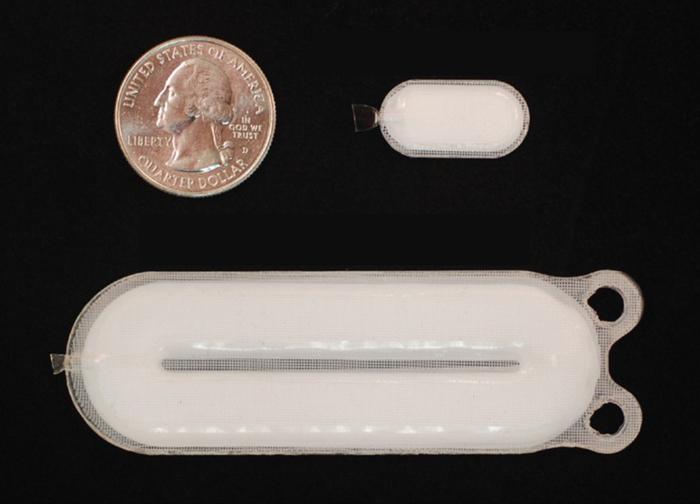An innovative stem cell-based treatment for Type 1 diabetes can meaningfully regulate blood glucose levels and reduce dependence on daily insulin injections, according to new clinical trial results from the University of British Columbia (UBC) and Vancouver Coastal Health (VCH).

Credit: ViaCyte
An innovative stem cell-based treatment for Type 1 diabetes can meaningfully regulate blood glucose levels and reduce dependence on daily insulin injections, according to new clinical trial results from the University of British Columbia (UBC) and Vancouver Coastal Health (VCH).
“This is a significant step toward a functional cure for Type 1 diabetes,” said Dr. David Thompson, principal investigator at the Vancouver trial site, clinical professor of endocrinology at UBC and director of the Vancouver General Hospital Diabetes Centre. “For the first time, a stem cell-based device can reduce the amount of insulin required for some trial participants with Type 1 diabetes. With further refinement of this approach, it’s only a matter of time until we have a therapy that can eliminate the need for daily insulin injections entirely.”
The findings, published today in Nature Biotechnology, arise from a multicenter clinical trial for an experimental cell therapy developed by U.S. biotechnology company ViaCyte (acquired by Vertex Pharmaceuticals) that is being clinically tested in Canada.
The therapy aims to replace the insulin-producing beta cells that people with Type 1 diabetes lack. Dubbed VC-02, the small medical implant contains millions of lab-grown pancreatic islet cells, including beta cells, that originate from a line of pluripotent stem cells.
The devices — approximately the size of a Band-Aid and no thicker than a credit card — are implanted just beneath a patient’s skin where it is hoped they will provide a steady, long-term regulated supply of self-sustaining insulin.
“Each device is like a miniature insulin-producing factory,” said co-author Dr. Timothy Kieffer, a professor within the departments of surgery and cellular and physiological sciences at UBC, and past chief scientific officer of ViaCyte. “The pancreatic islet cells, grown from stem cells, are packaged into the device to essentially recreate the blood sugar-regulating functions of a healthy pancreas. This may have tremendous benefits over transplant of scarcely available donor-derived cells, given that we can create a virtually limitless supply.”
The clinical trial was conducted at Vancouver General Hospital, with additional sites in Belgium and the U.S. Ten participants, each of whom had no detectable insulin production at the start of the study, underwent surgery to receive up to 10 device implants each.
Six months later, three participants showed significant markers of insulin production and maintained those levels throughout the remainder of the year-long study. These participants spent more time in an optimal blood glucose range and reduced their intake of externally administered insulin.
One participant, in particular, showed remarkable improvement, with time spent in the target blood glucose range increasing from 55 to 85 per cent, and a 44-per-cent reduction in their daily insulin administration.
The results are the latest in a series of clinical trials funded by Canada’s Stem Cell Network and conducted by the UBC-VCH team.
“The Stem Cell Network is delighted to support this clinical trial and we’re pleased to see the promising results,” said Cate Murray, president and CEO of the SCN. “Moving toward a functional cure for diabetes will require a coordinated and collaborative effort. It takes excellent science by top researchers in world-leading institutions, funders, like SCN, that de-risk research, and innovative biotech companies that can manufacture and scale the technology. SCN is proud to play its part and we look forward to what’s next in game-changing diabetes research.”
The trials aim to accelerate the development and clinical testing of novel stem-cell based therapies for the 300,000 Canadians living with Type 1 diabetes. Diabetes is estimated to cost the Canadian health-care system $29 billion annually.
Previously, in a 2021 study in Cell Stem Cell, the researchers were the first to show that the approach could produce insulin in the human body. The latest trial sought to significantly increase the amount of insulin produced by leveraging two-to-three times more devices per participant, alongside an updated device design with small perforations to allow for blood vessel ingrowth — a feature aimed at improving survival of the lab-grown cells.
In another ongoing trial, the UBC-VCH team is investigating whether a version of the device containing cells that have been genetically engineered to evade the immune system, using CRISPR gene-editing technology, could eliminate the need for participants to take immunosuppressant drugs alongside the treatment.
“We envision a future where people with Type 1 diabetes are able to live their lives free from daily insulin injections and free from immune-suppressing drugs,” said Dr. Thompson. “That future is now within reach, and Canada is leading the way in efforts to bring these novel treatments to patients.”
These trials are continuing to recruit participants. People who are interested in participating and want to learn more can contact study coordinator Barbara Allan ([email protected]).
Interview language(s): English
Journal
Nature Biotechnology
DOI
10.1038/s41587-023-02055-5
Method of Research
Randomized controlled/clinical trial
Subject of Research
People
Article Title
Encapsulated stem cell–derived β cells exert glucose control in patients with type 1 diabetes
Article Publication Date
27-Nov-2023
COI Statement
E.J.K, M.D., R.W., M.S.J., T.J.K. and H.L.F were employees of ViaCyte, Inc., a privately held company that produces PEC-Direct. M.D.B. declares consulting/DSMB memberships for Insulet, Vertex and Emerging Therapy Solutions. D.P. declares non-financial competing interests as a member of the ViaCyte Clinical Advisory Board. B.K., K.D.G., D.J.-T.-T. and D.M.T. declare no competing interests.




